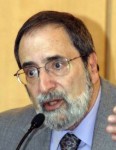By Laurie Baron

SAN DIEGO — The Ken Cinema (4061 Adams Avenue) will reprise Nicolas Winding Refn’s Drive (2011) for the midnight shows this Friday and Saturday. The film which earned Refn the award for best director at Cannes is filled with gory killings that will repel squeamish viewers. For those who can stomach the excessive violence, the movie possesses a stylish film-noir of Los Angeles at night and effective performances by Ryan Gosling, Carey Mulligan, Bryan Cranston, Albert Brooks, and Ron Perlman.
Gosling coolly glides through his role as a nameless stunt and getaway driver who performs in staged chase scenes by day and participates in dangerous real ones at night. Attracted to his neighbor Irene played by Mulligan, he bonds with her son Benicio whose father is in prison. The return of the father seems to doom this relationship, but when thugs beat him up for refusing to rob a pawn shop to pay off a debt and then threaten his son and wife, the driver volunteers to drive the getaway car and thereby protect Irene and Benicio from harm. The heist goes awry, and, the driver is literally left holding a bag of loot that the surly Nino, menacingly acted by Ron Perlman, claims is his.
By now, you are probably asking why Drive should be reviewed in a column on Jewish film. That can be answered in two words: Albert Brooks. Brooks overshadows the rest of the cast as Bernie Rose, Nino’s affable but equally homicidal accomplice. He received 21 nominations for best supporting actor from various film festivals and organizations including the Golden Globes and won 10 of them. Playing against his comic personae, Brooks endows his character with a haimishness that belies his ruthlessness for dispassionately dispensing what he deems is warranted retribution. This contradictory combination of traits makes him one of the most interesting Jewish villains in recent cinema.
Bernie’s trademark is his love for Chinese food which he brings along even when he visits Nino’s pizzeria. While the audience might assume that Nino is Italian given his name and restaurant, Bernie dispels this error by kidding him, “What’s a Jew doing running a pizzeria?” Bernie first meets Gosling when the latter is recruited to drive a race car which Bernie has purchased. Extending his hand to the driver who has been fixing a motor, the driver considerately withdraws his hands explaining they’re a “little dirty.” “So are mine,” Bernie replies, intimating that his real profession involves something more illicit than racing.
Bernie could easily fade out of the movie at this point since it is Nino who orders his minions to punish the driver for absconding with the cash. Contrarily, Bernie is irate that Nino conspired to take money which belonged to an East Coast crime syndicate since this is tantamount to stealing from “family.” Nino explodes with resentment for the presumable Italian confederates who have called him a “kike” to his face over the years. Bernie chooses to side with Nino and resolve the matter.
The two rivals constitute mirror images of each other. The driver ruthlessly liquidates anyone who endangers Irene and Benicio, and Bernie methodically avenges his partner by slaying his opponents. Though Bernie feels obligated to hunt down the driver, he recognizes that Irene and her son are innocent bystanders. Negotiating with the driver at a Chinese Restaurant, Bernie tries to strike a fair bargain: “You give me the money, the girl is safe. Forever. Nobody knows about her. She’s off the map. I can’t offer you the same. So, this is what I would suggest. We conclude our deal. We’ll shake hands. You start the rest of your life. Any dreams you have, or plans, or hopes for your future… I think you’re going to have to put that on hold. For the rest of your life you’re going to be looking over your shoulder. I’m just telling you this because I want you to know the truth. But the girl is safe.” Of course, I have no intention of revealing what transpires after that.
The film’s theme song implies that there is an ethic of mentschlichkeit behind the driver’s actions who is praised as “a real human being and a real hero.” It would not be a stretch of the imagination to find a similar, albeit less obviously altruistic, logic guiding Bernie’s decisions to salvage a bit of justice for Irene and her son from the otherwise vicious vendetta.
*
Baron, a professor emeritus of history at San Diego State University, has written two major books on Jewish film, including Projecting the Holocaust into the Future. He may be contacted at lawrence.baron@sdjewishworld.com